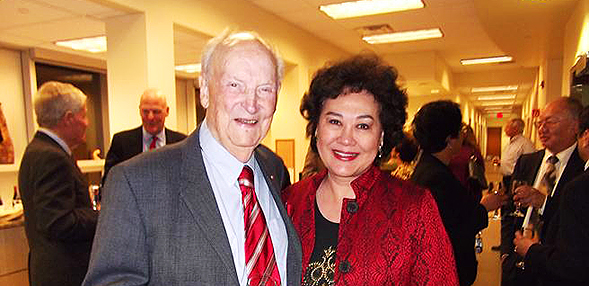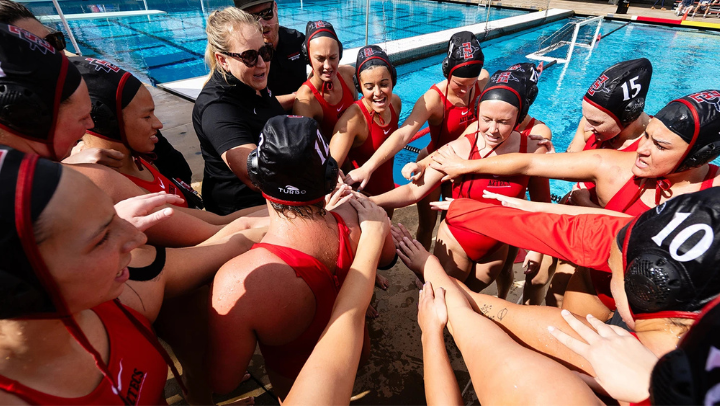In Memoriam: Ambassador Charles W. Hostler
Hostler was a war hero, scholar, diplomat, businessman, philanthropist and friend to SDSU.

Ambassador Charles W. Hostler, who lived an extraordinary life of adventure and accomplishment while serving his country, passed away on Sept. 28. He was 94.
War hero, scholar, diplomat, businessman and philanthropist, Hostler visited 175 countries, lived on four continents, and received decorations for his valiant actions from nine nations and four religious leaders.
He was a generous supporter of San Diego State University for more than a decade.
Hostler will be buried in Arlington National Cemetery, alongside his father, Sidney Marvin Hostler, a U.S. Army officer during World War I.
“Charles Hostler was a visionary and a true American hero,” said SDSU president Elliot Hirshman. “His passion for international affairs and international collaboration left an indelible mark on our campus’ academic and co-curricular programs. His influence will be felt by generations of students, faculty and staff to come, and we are deeply grateful for his support and his leadership of our efforts to internationalize our campus.”
Hostler was born in Chicago on Dec. 12, 1919 to a British mother and an American father who met in France. As a young boy, he attended boarding school in England and learned to speak French fluently—a talent that would prove invaluable during his service in the Army Air Corps, attached to the Office of Strategic Service (OSS), precursor to the Central Intelligence Agency (CIA).
His counter-espionage unit landed at Utah Beach on D-Day, June 6, 1944. During and after WWII, Hostler carried out many clandestine missions for the OSS and CIA. On June 6, 2004, he was chosen by the French government to represent the United States during the celebrations of the 60th Anniversary of the D-Day landings. French President Jacques Chirac personally presented him with the French Legion of Honor in the presence of 17 heads of state in Normandy, France.
Years later, when Hostler received a distinguished service award from the OSS Society, he told the audience: “Looking back, there were two major influences on my life: the great depression and OSS. The depression gave me perspective and humility. The OSS taught me how to survive and helped me excel. Both left an indelible mark on my character. General Dwight Eisenhower himself said that the OSS’s covert contributions were worth the equivalent of a military division in Europe and saved thousands of lives.”
Following Hostler’s retirement as a colonel in 1963, he worked in private industry for 11 years—based in Beirut, Paris and California—before President Richard Nixon appointed him deputy assistant secretary for international commerce and director of the Bureau of International Commerce. He continued in that position under President Gerald Ford.
In 1977, Hostler left the federal government and moved to San Diego. For the next 12 years, he was appointed to several public service commissions, including the California State Parks and Recreation Commission.
He also became active in People to People International, an initiative created by then-President Dwight Eisenhower in 1956 to enhance peace through understanding and global friendship through educational, cultural and humanitarian activities.
But Hostler’s most prestigious role was yet to come. In recognition of his OSS and CIA experience in the Middle East, President George H.W. Bush appointed him U.S. Ambassador to Bahrain, a position he held from October 1989 to March 1993, during the Persian Gulf War and Operation Desert Storm.
At age 74, Hostler left Bahrain for San Diego, where he was to live for the remainder of his life. He met Chinyeh Rose, a Taiwanese native and San Diego State University alumna, who became his adviser and traveling companion. She encouraged him to write his autobiography, “Soldier to Ambassador,” which was published in 2003 and accepted into the Library of Congress.
During his lifetime, Hostler earned numerous degrees, including an M.A. and a Ph.D. in political science from Georgetown University, and an M.A. in Middle Eastern studies from American University of Beirut. He also received three honorary doctorate degrees and was appointed Honorary Consul General of the Kingdom of Bahrain.
Through frugality and careful investments, Hostler established the five-building Hostler Student Center at the American University of Beirut. He and Chinyeh also supported many San Diego institutions, including San Diego State University, where Hostler became an adjunct professor of political science and helped secure prominent speakers for SDSU’s Institute on World Affairs. He later endowed the institute—which was named in his honor.
Hostler and Chinyeh also funded a fellowship program at SDSU and supported the university’s Joan and Art Barron Veterans Center. On Feb. 21, 2014, SDSU dedicated Charles Hostler Hall in recognition of the couple’s $3-million gift to support international studies.
Hostler was pre-deceased by his son, Charles Hostler Jr., and is survived by his wife, Chinyeh. A celebration of his life will be held on the San Diego State campus later this year.



